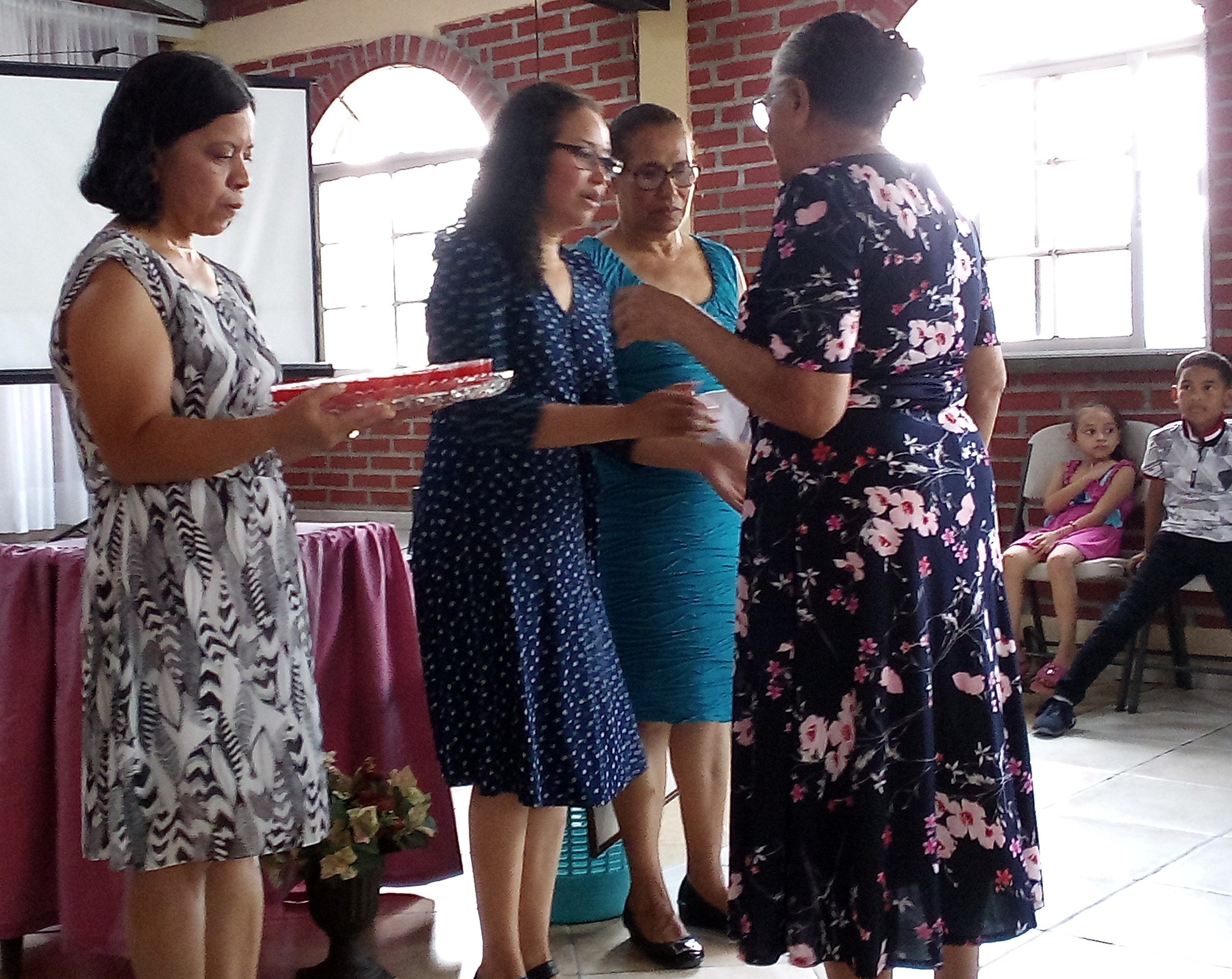Last week I had the wonderful opportunity to listen to my daughter Christie preach on the theme of community. She included a brief explanation of bounded, fuzzy, and centered and shared the soccer example from Centered-Set Church (47). She stated that the players had to confront the offending player and tell her to stop picking up the ball. If not, they would not be playing soccer. Then Christie asked, “What are things that do not belong here if we are to experience rich Christian community? What are things we could not allow just as the soccer players could not allow someone to use their hands?” I thought, “What a great question. I wish I had included that in the book.” A society saturated in tolerance as supreme virtue gets nervous about any sort of confrontation telling someone they are out of line. Christie’s question not only led the listeners from the generality of the illustration to their real-life situation, it also facilitated a shift from the societal default to a stance of recognizing there are times we do need to say, “that does not belong here.”
That was not the first time I heard or read something and thought, “That’s great. I wish that was in the book.” In fact, I have kept a list of them. In this blog I share the list with you. Most of them are short, a line or two, some a bit longer. May you find them useful as I have, and please send me items you think I could add to the list.
Brad Isaak, a youth pastor, shared with me a line he has used when confronting youth about problematic behavior at youth group. He says to them, “if you do that here then here will be no different than anywhere else.” Similar to Christie’s question, Brad’s statement communicates that standards have value. Note the difference from bounded. Brad is not communicating, “If you want to be in, if you want to avoid shame, keep the rules.” Rather his statement has an invitational quality. It invites them to be part of making something of value that they will get to experience.
Some great sentences:
“This is the very nature of God, that we work from the place of God’s blessing and love, not for it.” Dustin Maddox, 10/23/22, North Fresno Church
“Jesus was not killed because of who he excluded. Jesus was killed because of who he included.” John Richardson, sermon, Prodigal Church 8/3/24
To add to list of questions on pages 164-65 in book: “What is your next step?” When I asked Dan Serdahl what are ways his church avoids fuzziness he told me they regularly use this question.
“Few things could be more transformational than a community that devotes less energy to policing its borders and more to elevating and celebrating its glorious center of gravity.” Meghan Good, Divine Gravity, 115.
Karl Barth in a letter to someone who had sent him a book they wrote critiquing others’ theology. “You say many correct things. But what is correct is not always true. Only what is said kindly is true. You do not speak kindly in a single line.” Karl Barth Letters 1961-1968, p. 328
“bounded progressive” – a phrase Megan Good used in a Jesus Collective webinar on centered-set church (2/23/23). I find it helpful in communicating it is not just conservatives, or legalists that are bounded.
Illustrations of distinguishing the center from things not part of the center:
In the discussion time after my presentation at a regional event of the Reformed Church of America in Omaha (7/22/23), Jon Garbison, commented on how a church’s shared center is like overlapping sections in a Venn diagram. The parts that are not shared, need to be recognized and agreed on as non-essential.
Meghan Good uses a dart board analogy. Bull’s eye represents what is most central and where there is total accord. Each ring out less so. That is not to say those things are not important, but that there can be differences. “There are also legitimate reasons for groups to separate when it becomes apparent they are operating with different bullseyes or even different outer rings. There is no ‘rule’ for exactly how much must be shared in order to cooperate. The decision will often be affected by a group’s specific mission. Mission goes awry when the people working together are aiming at different targets, flinging their darts crossways with each other. Some forms of mission may require only the bullseye be in common. Other forms of mission directly implicate the outer rings. The important thing to keep in mind is that it is possible to recognize that missions have diverged without lighting anyone else’s dartboard on fire” (111).
David French, on the Russell Moore Show podcast, Sept. 4, 2024, said that in a pluralistic society you have a hard core but soft edges so you do not hurt others when you bump into differences. As he said that I thought, bounded churches have hard edges. A centered church has a hard core, but can have soft edges.
Centered approach takes time
This idea is in the book, but Greg Applequist went deeper with the idea. This is an email he sent me after I spoke at the Evangelical Covenant Church Midwest Region’s pastor and spouse retreat last October.
“As we spoke on Tuesday, the idea of time came to my mind. To live in a centered church requires us to recognize that things take time. I have found that when challenge comes, most people don't want to take the necessary time to sit in the middle of the challenge. About 18 months ago we had a youth volunteer tell us he was transgender and was going to present as female. As you can imagine, this was difficult. There were immediate decisions we had to make (could she continue to work with students), but there were larger discernment we had to face as well. As I think about that specific situation, to be a centered church would be to take time to know her story, explore the Scriptures, share our concerns/fears/hopes, understand what our students were facing in terms of sexual identity and so much more. Many in our church simply wanted an answer, is it right or wrong, or as we can see now, is she in or out? I wonder if people today are so concerned about being right or wrong that they don't have the patience or stamina to live in the grey (not the fuzzy) as we discern together how to move forward. To be centered is to take the necessary time together. I wonder if the greatest challenge to being centered is the immediacy that we all live with. The tyranny of the urgent makes it much more difficult to live in the wisdom of the center.”
Trajectory Principle: Directional vs. positional
Meghan Good, includes just a bit of explicit bounded, fuzzy, centered language in her book Divine Gravity, but the concepts are discernable throughout. I recommend the book to you. I find her language of “trajectory” and directional vs. positional especially helpful.
Great questions: “What would change if you valued trajectory over position? Who or what might you see differently? (115).
She uses Jesus’ parable of the Pharisee and tax collector to illustrate the trajectory principle (Luke 18:9-14). After reading her interpretation last year, I began using this parable in all my presentations of the centered-set church concept. I wish it was in the book. I commend it to you. In just a few minutes you can illustrate that Jesus was centered--not bounded or fuzzy.
Luke makes clear that Jesus directs this parable at bounded-church types. “To some who were confident of their own righteousness and looked down on everyone else, Jesus told this parable . . .” The Pharisee in the parable displays exactly that attitude.
If Jesus used the bounded approach, and looked at the men’s position in relation to the line, the Pharisee would be in—part of the group. The tax collector would be out—on the wrong side of the line. But referring to the tax collector Jesus says, “I tell you that this man, rather than the other, went home justified before God” (14). How can Jesus say it is the tax collector who is justified, included, in? Meghan Good observes that Jesus evaluated trajectory rather than position. The tax collector’s repentant attitude (“God, have mercy on me, a sinner”) displays a turning, an orientation toward God. In relation to the line, the Pharisee is compliant and in a good position, but his attitude displays that his orientation is not in line with the way of Jesus. He is headed the wrong direction. Jesus is not bounded; he is also not fuzzy. He does not say “let’s be tolerant; they are both fine.”
Borrow, share, send me more
Please borrow and use these ideas. Please share this blog with those you know who have read the book Centered-Set Church. Are there people you know who have not read the book that would benefit from doing so?











